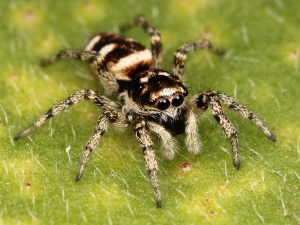(A discussion of how fear and anxiety evolved in animals is found in my book.)
Some animals are genetically programmed to fear their predators. Mice naturally fear cats; fish naturally fear birds. But what about humans? Are we naturally disposed to fear certain dangerous animals?
It is certainly true that some things are feared more commonly than others, such as snakes, spiders, and rats, but this could be the result of conditioning, more than programming. Perhaps we learn to fear snakes and spiders because they bite and we fear rats because we were taught that they spread plague and pestilence.
Or maybe not. Scientists studying fear conditioning have noticed that it is easier to train humans to fear snakes and spiders than things like friendly dogs and fluffy pillows. This is especially true for children, and indeed, some very young children are afraid of these animals before ever having encountered them or heard about them.
Thus, there appears to be a preconditioned human tendency to fear snakes and spiders. This would make sense because throughout human evolution, these animals have accounted for countless deaths, and having an inborn avoidance instinct would bring a distinct survival advantage, especially for young children.
Importantly, these studies have revealed that humans have a predisposition toward fear of snakes and spiders rather than a universal and firmly programmed fear of them. Predispositions don’t always blossom into reality; they just increase the likelihood thereof.
Plenty of people out there actually love snakes and spiders and end up keeping them as pets or studying them as a career. For these (weird) people, in the absence of a conditioning event, the predisposition toward fearing these animals was never triggered.
If there really is a human predisposition toward fearing snakes and spiders, we might expect to see this in some of our close relatives as well. After all, the lethal danger that these critters pose is in no way restricted to human beings. Obviously, we would not expect to find it in any animals that have evolved to hunt snakes or spiders, since they would have necessarily lost any such aversion.)
Studies have shown that virtually all monkey species show a fear of snakes in the wild, while most monkeys in captivity do not. However, this does not address the issue of predisposition. Most humans are not born afraid of snakes, but they are much more likely to become afraid of them than they are to become afraid of most other kinds of animals. The question is, do other primates show a predisposition toward fearing snakes or spiders?
To answer this, Susan Mineka and Michael Cook at Northwestern University conducted a set of clever experiments with rhesus monkeys that revealed that the connection between predisposition and exposure is even more intricate than previously thought. In this experiment, the researchers tried to train naïve monkeys to fear snakes by having them watch videos of other monkeys behaving fearfully toward snakes or crocodiles.
It worked! The naïve monkeys actually “caught” the fear of snakes and crocodiles after watching conspecifics being afraid of them. No monkeys were actually harmed, and no fear conditioning with loud sounds, shocks, or pain took place. The observer monkeys simply saw from the sounds and body language of the monkeys in the videos that they were afraid of the snakes and crocodiles. This shows that, in monkeys, the fear of danger can be learned from others, not just through direct experience.
The experiment went further still. The vicarious fear conditioning was not effective when the researchers attempted to train the monkeys to fear flowers. In this setup, the researchers had to use creative splicing and editing to create convincing videos of rhesus monkeys behaving as though they were afraid of some artificial flowers. However, when other monkeys watched this video, they did not acquire any conditioned fear of real or artificial flowers. The fear contagion simply did not work.
It’s possible that the monkeys’ fear response was just not easily fooled into fearing things that were not harmful. I don’t think that’s the case because how would they know the flowers weren’t harmful? These were lab monkeys. They had no prior exposure to snakes or flowers. Instead, I think this fascinating experiment shows that there is a preprogrammed predisposition toward fearing snakes and crocodiles in monkeys.
It turns out that most primates fear snakes just as much as most humans do—and for good reason. Throughout the long evolutionary history of primates, snakes have consistently been among their most deadly predators. We can now say with some confidence that the human tendency to fear snakes was almost certainly inherited from our primate ancestors.
Anthropologist Lynne Isbell has even made the controversial claim that detection and avoidance of snakes has had a substantial impact on the evolution of primate vision, fear, and intelligence. Her thesis holds that, in primates, including humans, one of the main evolutionary forces in the honing of our visual skills was our constant need to spot and identify snakes. Then, we developed the fear and avoidance of those snakes, as described above. Finally, natural selection favored those primates that were able to remember where the snakes were, figure out how they hunted, learn to avoid them, and so on.
In other words, according to Isbell, one of the strongest forces driving the rapid development of primate intelligence was avoiding and outsmarting snakes.
I might not go that far, but it seems undeniable that fear of snakes is not so much a phobia as an ancient, natural, and justified fear of a lethal predator. I knew it! I agree with Indiana Jones on this one: man, I hate snakes.
-NHL (@nathanlents)






Does the geographic location where your people evolved influence the degree of predisposition to fear of snakes? For example, if your people evolved in a snake-free environment (islands?), would they be less apt to be afraid than people that spent time evolving in the Amazon where snakes are plentiful? In other words, are Hawaiians less fearful than Brazilians?
LikeLike
That’s a great question. However, I think that is very unlikely. This is because the length of time that the human race has dispersed from our common ancestors is tiny compared to how long the snake-fear might have been favored. Fear of snakes is found in many primate species, meaning that it is tens of millions of years old. Humans have been living on snake-less islands for just tens of thousands of years (at most), an evolutionary blink of an eye.
Remember that natural selection takes time. In order to lose a genetically influenced snake-fear, it would be necessary to have mutation(s) occur to disrupt the snake-fearing AND have those mutations take over in the population over time. Someone who lost the snake-fear wouldn’t have an advantage, so how would the loss of fear take over so rapidly? When a selective pressure is removed, say, snakes; it takes time (and survival difference) to lose whatever adaptation the pressure had previously induced.
It is true that removing pressure usually does mean that, eventually, the adaptation will be lost, but that’s over the course of millions of years (and random genetic drift events), not mere thousands of years. So, although no one has looked that I know of, I would very much doubt that there are genetic differences in snake-fear among different geographical ancestral groups.
Great question, though!
LikeLike
I think you make a good point in that it would take much longer time for the adaptive fear of snakes to disappear from the human genome in the absence of the selective pressure, i. e. snakes then the time period people have lived out of their original African planes. However, I would slightly disagree that being non-fearful of snakes brings no advantages in the snake-free environment. It is known that dysregulation of fear in the form of ophidiophobia considerably limits the individuals live and with 2 – 3% prevalence in the general population there are millions of people worldwide suffering from such irrational snake fear. Thus, I could imagine that those, who were not afraid of snakes when it was not necessary, might have a major advantage over the phobics – who were scared to leave their cave, missing chances to find sources of food, sexual parners,…
LikeLike
Good point. One question is whether the latent genetic tendency to fear snake would be activated without a triggering event. If this inborn tendency gets sloppily triggered into fear of other non-harmful things in a snake-free environment, I think you are right that there would be selective pressure against it. If it just remained latent and found no expression at all, there might not be pressure either way.
LikeLike
For most situations you will not need to seem at court to resolve
your case if you hire the proper lawyer.
LikeLike
Reblogged this on pankeahomtfy.
LikeLike
My Evolution and Human Behaviour class is assigned to do blogs also! This blog post inspired me to do my next blog post on this same subject. You have a lot of great information in this post, and I’m having a lot of fun doing my own research on the subject. Thank you for sharing this!
LikeLike
I’m glad you have enjoyed the blog. Good luck with your own post. If you’re allowed to cross-post, feel free to send to me and maybe we can work it onto this blog also. 🙂
LikeLiked by 1 person